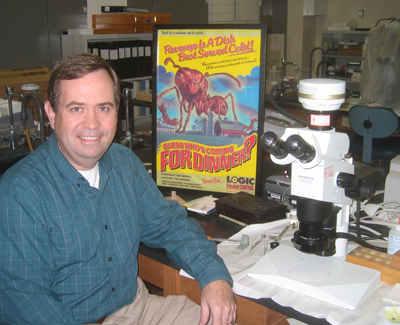Fire Ants Rejoice--Jerry Cook is Leaving Texas!
 |
| Jerry Cook in his lab, with one of his favorite fire ant
bait posters. |
Fire ants in Texas can kick up their little heels with glee.
Jerry Cook is leaving the state, but the insect celebration may
not be a long one.
Cook, one of Sam Houston State University's top researchers,
will take a job with the National Science Foundation in Arlington,
Va., Jan. 1. But he vows it will not affect his fight against
fire ants in Texas.
Cook, associate professor of biology, was
asked by the National Science Foundation to become their program
director for systematics and biological survey and inventory.
He agreed to take the job, for a minimum of a year
with no plans to stay longer, and his colleagues in the College
of Arts and Sciences say it is quite an honor for him and for
Sam Houston State.
As a program director, Cook will primarily be in
charge of overseeing grants. This includes talking to scientists,
submitting proposals, arranging reviews and review panels to
evaluate proposals, awarding grants and overseeing grants.
"What I hope to bring back to Sam Houston
State University is more knowledge of the granting process and
some visibility for my program and the university," he said. "Almost
all of the other program directors are from research intensive
universities, and my appointment means that SHSU is at least
on the radar of the National Science Foundation."
Cook credited
other researchers at SHSU who have received NSF grants, as
he has, and who have served on grant panels and as reviewers.
The main focus of Cook's research has been ants, especially
red imported fire ants. Some of his funds have come from the
Texas National Guard.
"They manage large tracts of land and are
serious about being good land stewards," said Cook. "At
one of their sites, Camp Swift, near Bastrop, fire ants were
eliminating a rare harvester ant."
The Guard is also concerned
with managing fire ants in their training area and keeping their
troops from ant attacks while practicing how to repel more traditional
enemy attacks.
Cook has also worked with the U. S. Forest Service
to determine if their burning and thinning practices might be
encouraging the introduction of more fire ants. After three years
of study, he concluded that these practices "appear to be
having only minimal effects on ant populations."
Cook continues to monitor ant populations and to
evaluate new control products. Some have suggested the use of
large amounts of bait to try to eradicate fire ants.
"It was tried once when Mirex was available
and was spread across parts of the southern United States by
airplanes," he said. "The net result was that most
fire ants were eliminated in the areas covered, along with almost
all of the other ants in the area.
"A year later, the areas had larger numbers
of fire ants than before and native ant species were gone."
Cook
has also done studies at National Guard sites and the Center
for Biological Field Studies at SHSU on a parasitic fly that
attacks only fire ants, which does impact the ants but does not
eliminate them.
"Other groups are also releasing them in other
parts of Texas, which should help put pressure on fire ants," he
said, "but the ants are here to stay."
Cook also studies the insect parasite Strepsiptera,
working with the California Academy of Sciences, examining Strepsiptera
species collected in Madagascar. He is also working with a University
of Kentucky researcher who collects Strepsiptera in Colombia
and Thailand.
"Strepsipterans have no effect on humans," he
said, "except that they are part of the diversity of life,
all of which affects other parts of life, including us."
One of Cook's areas of research that does have
a direct effect on human "life," or at least investigations
into how it ends, is his work on forensic entomology. For example,
fly maggots found on a body can help estimate time of death and
tell if the person had drugs or other toxic substances in their
body.
Cook worked on a homicide case with the Texas Rangers
this past summer, and is writing a text on forensic entomology
that is scheduled for publication next year.
His several research areas are all good reasons
that he plans to return often to Huntsville, in addition to the
fact that his wife, Tamara, will continue to teach in the Sam
Houston State biology program.
"I have three graduate students and four undergraduates
working in the lab," he said. "and I have two active
research grants not counting my NSF grant that I have to give
up when I become a program officer at NSF. My lab will remain
active during the year I am away."
—END—
SHSU Media Contact: Frank Krystyniak
Oct. 26, 2006
Please send comments, corrections, news tips to Today@Sam.edu.
|


